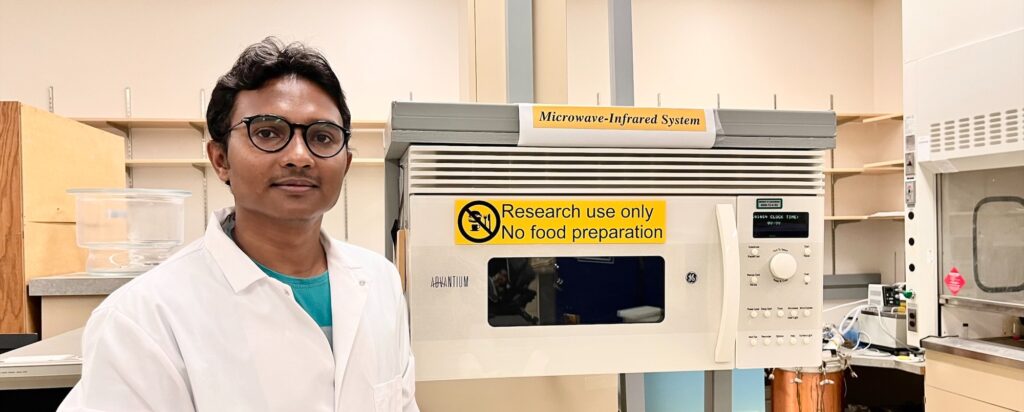An NSERC program is delivering an enriched research and training experience to graduate students involving collaborations with the cannabis and agri-food industries.
Canada’s Cannabis Act has built a platform for researchers, industry and government to work together toward improving cannabis product quality and safety. In 2020, the QAQC for Cannabis Production, Products and Training (or QAQCC) Program was launched to support graduate students performing research in this field by NSERC’s CREATE industrial funding stream. The program will train at least 70 highly qualified personnel, fortifying Canada’s position as a global leader in this area. The QAQCC spans several STEM disciplines, involving researchers from three academic institutions (McGill University, the University of Ottawa and the University of Saskatchewan), industrial collaborators across the country and Health Canada. Program Director Dr. Mark Lefsrud at McGill University has longstanding ties to western Canada’s agricultural sector—he grew up on a farm in Viking, Alberta, and completed his B.Eng. at the University of Saskatchewan. Other principal investigators at the University of Saskatchewan include Drs. Lope Tabil and Vladimir Vujanovic, in the Colleges of Engineering and Agriculture and Bioresource, respectively. Drs. Oon-Doo Baik and Tim Sharbel also co-supervise graduate students enrolled in the QAQCC.
Students’ research encompasses all aspects of the cannabis/hemp supply chain, yet much of their work is applicable to other crops, plant-based foods, nutraceuticals and pharmaceutical products. Several students are optimizing new methods for post-harvest processing that include drying, milling and extraction. Others are focused on bio-stimulants and fertilizer use, as well as new food products, bio-delivery systems and product safety. While fulfilling the requirements of their graduate degrees, trainees participate in workshops facilitated by Health Canada, and experts in HACCP and GMP.
Student internships are another essential component of the QAQCC that has been validated as a post-secondary CO-OP Program by the Canadian government. Students complete internships with industrial partners or at Health Canada to bridge gaps between academia, industry and government, so that they are ‘job-ready’ upon graduation. While stipends are partially covered by NSERC, important financial support is provided through these paid internships that are proving mutually beneficial. Collaborations to date help address current industry challenges, R & D and upscale projects that are strengthened by researchers’ and students’ areas of expertise. Approximate costs for hosting a QAQCC intern are $10,000 for 3-4 months (MSc students) or $20,000 for 7-8 months (PhD), amounting to just under 20$/hour for a 35-h work week. This cost may be lessened if considering the Mitacs Accelerate or NRC IRAP programs. Some QAQCC collaborations have lead to improved production and optimized post-harvest processing that have lowered operational costs. Others have contributed to Canada’s ever-evolving regulatory framework.
The QAQCC’ s network is expanding, and is open to new alliances with the cannabis or agri-food sector, as well as governmental agencies, that would like to explore new solutions that may drive enterprise and innovation forward. The QAQCC’s success is largely due to its interactions with over 30 corporate entities and at least three divisions in Health Canada’s Cannabis Directorates. The program’s solid reputation is backed by researchers’ proven expertise, the quality of its interns and graduates, and its commitment to sharing knowledge. Graduate students are encouraged to present findings at conferences; some have traveled as far as the US, Europe, and Africa. Others recently communicated their work to the International Cannabinoid Research Society Symposium and the Canadian Society of Plant Biologists. This month, several QAQCC trainees will present at the American Society of Agricultural and Engineers’ (ASABE) Annual International Meeting in Nebraska. The QAQCC and the McGill Research Centre for Cannabis co-host the Cannabis Scientific Symposium: From Plants to People. This event brings together all QAQCC members together, in addition to researchers from across Canada and around the world. It is well attended by licensed producers, analytical laboratories, auxiliary service providers and Health Canada, encouraging interdisciplinary dialogue and facilitating communication between all participants.
To learn more about the QAQCC, please visit qaqcc.com. If you would like to learn more about its collaborative partnerships and internship opportunities in your area, kindly email sarah.macpherson@mcgill.ca
Thank you to Quality Assurance & Quality Control for Cannabis (QAQCC) for submitting the photos and article.
